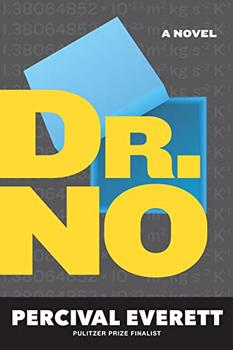Summary | Excerpt | Reviews | Beyond the Book | Readalikes | Genres & Themes | Author Bio

A Novel
by Percival EverettDon't go around saying the world owes you a living. The world owes you nothing. It was here first.
—Mark Twain
DR. NO
Existential quantifier
1
I recall that I am extremely forgetful. I believe I am. I think I know that I am forgetful. Though I remember having forgotten, I cannot recall what it was that I forgot or what forgetting feels like. When I was a kid, my mother tried to convince me that I was forgetful by saying, "Do you remember when you forgot your own birthday?" I think I replied, "How could I?" But it was a trick question. Saying yes would have been an admission of my forgetfulness and saying no would have been an example. "The brain does what it can," I told her. If we remembered everything, we would have no language for remembering and forgetting. As well, nothing would be important. In fact, nothing is important. The importance of nothing is that it is the measure of that which is not nothing. Is nothing the same as nothingness? Students love to imagine such things. There is in fact no nothing; the simplistic argument for this assertion is that the observation of nothing requires an observer, and so the presence of the onlooker negates what might have been pure absence, what might have actually been nothing. If nothing falls in a forest and there is no one around to observe it, does it make a nil? The better argument, one that embodies the simple one and any other, is that one can spell nothing. Parmenides might have been a shabby dresser, but he had a point. The ontological argument might not have worked for the existence of God, but it is indisputable for the existence of nothing. Ei mitään, rien, nada, nicht, nic, dim byd, ikke noget, ingenting, waxba, tidak ada, boten, apa-apa, kitn, nihil, and nenio. Kind of an ontological argument for the existence of nothing.
My name is Wala Kitu. Wala is Tagalog for nothing, though I am not Filipino. Kitu is Swahili for nothing, though my parents are not from Tanzania. My parents, both mathematicians, knew that two negatives yield a positive, therefore am I so named. I am Wala Kitu. That is all bullshit, with a capital bull. My name is Ralph Townsend. My mother was an artist, my father was an English professor who ended up driving a taxi. I am, in fact, a mathematician of a sort. But I use the name Wala Kitu. I study nothing.
I am serious about my study. I am a distinguished professor of mathematics at Brown University, though I have not for decades concerned myself with arithmetic, calculus, matrices, theorems, Hausdorff spaces, finite lattice representations, or anything else that involves values or numbers or representations of values or numbers or any such somethings, whether they have substance or not. I have spent my career in my little office on George Street in Providence contemplating and searching for nothing. I have not found it. It is sad for me that the mere introduction to my subject of interest necessarily ruins my study. I work very hard and wish I could say that I have nothing to show for it.
It was my expertise in nothing, not absolutely nothing, but positively nothing, that led me to work with, rather for, one John Milton Bradley Sill, a self-made billionaire with one goal, a goal that might have been intriguing to some, confounding and weird to most, idiotic to all, but at least easily articulated. John Milton Bradley Sill aspired to be a Bond villain, the fictitious nature of James Bond notwithstanding. He put like this: "I want to be a Bond villain." Simple.
We were sitting in a coffee shop on Thayer Street. It was eight on a Monday morning in November, the semester winding down and so the students who had dragged themselves in there were nearly sleepwalking. I was much like them. I had discovered only recently that I needed a full twelve hours of sleep to function properly but had sat up much of the night thinking about the meeting with Sill. I hardly ever remembered my dreams, which seemed right and fair as I rarely recalled my waking life during sleep.
Excerpted from Dr. No by Percival Everett. Copyright © 2022 by Percival Everett. Excerpted by permission of Graywolf Press. All rights reserved. No part of this excerpt may be reproduced or reprinted without permission in writing from the publisher.




The purpose of life is to be defeated by greater and greater things.
Click Here to find out who said this, as well as discovering other famous literary quotes!
Your guide toexceptional books
BookBrowse seeks out and recommends the best in contemporary fiction and nonfiction—books that not only engage and entertain but also deepen our understanding of ourselves and the world around us.